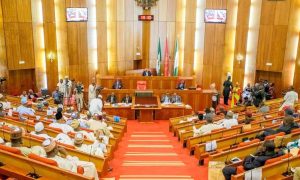This past week, we spotlight the keynote address of the governor of the CBN, Dr Olayemi Cardoso, at the 59th edition of the annual dinner of the Chartered Institute of Bankers of Nigeria (CIBN) held last Friday. Also, we assess the likely implications of the fresh $2.2bn Eurobond priced by the FG on Monday on fiscal viability.
Starting with the former, the CBN governor at the CIBN dinner expressed strong optimism that measures being deployed by his administration will deliver benefits that would be felt by every Nigerian in no distant time. The need for reassurance on the expected outcomes from policy measures being deployed by the CBN was necessitated by the growing pains of Nigerians due to the further deterioration of key macroeconomic variables (notably, inflation and exchange rate) that are within the purview of the monetary policy authority relative to when Dr. Cardoso assumed office last year September.
Recall that it was at this same CIBN event that the Apex bank chief first unveiled his administration’s key priority areas exactly a year ago, two months after assuming office. For perspective, the key priority focus areas highlighted by Dr. Cardoso were stabilising the exchange rate, curbing inflation, strengthening banks’ capital buffers, and fostering an environment conducive to the success of both businesses and individuals.
To drive these objectives, the Cardoso-led CBN administration has in the past year rolled out several measures. Specifically, the CBN in its quest to stabilise the exchange rate imposed a ceiling on banks’ Net Open Position to curb FX speculation, barred FCY cash payment to BTAs and PTAs applicants, streamlined the number of operators in the BDC market, resumed FX sales to authorised dealers to boost liquidity, and more recently, introduced an electronic FX matching system to enhance FX trading transparency.
To curb inflation, the CBN tightened the benchmark policy rate six times in 2024 (by a cumulative 850bps to 27.5%), intensified liquidity management by increasing the frequency of OMO sales at competitive rates, removed the ₦2.0bn ceiling on allowable interest-bearing deposits by DMBs at the Standing Deposit Facility (SDF) window, and end quasi-fiscal interventions as well as deficit financing.
The recapitalisation directives to banks that became effective in April 2024 have yielded some quick wins, evidenced by the successful capital raise exercise by some major lenders more than a year ahead of the June 2026 deadline. Also, the easing of capital control measures, including the clearing of the FX backlog of about $7.0bn, the timely facilitation of over $9.0bn principal capital & dividend outflows by qualified investors, and the reversal of the 2016 ban on access to FX in the official market for importers of 43 essential items headlined the multiple steps taken thus far by the CBN to restore foreign investor confidence and foster an environment conducive for businesses to thrive.
While we applaud the firm resolve of the CBN leadership toward achieving all of its objectives, we are concerned that the much-touted fiscal-monetary policy synergy, which even Dr. Cardoso alluded to in his keynote speech as an essential success ingredient, has been largely nonexistent or at best, requires more firepower. We believe this misalignment is largely responsible for the weak transmission of many of the CBN’s policies targeted at stemming inflation and halting FX volatility in the past year.
For instance, while the aggressive policy tightening by the CBN (including the hike in CRR by 12.5ppts to 45.0% and lowering of LDR by 15.0ppts to 50.0%) have begun to temper the growth rate of credit to the private sector (up by 27.5% in the 12 months to September 2024 vs 46.9% the prior 12 months), credit to the government expanded faster by 89.8% (previously: -3.0%) to ₦42.0tn. Against this backdrop, the broadest measure of money supply, the M3, expanded by 62.8% over the period to ₦109.0tn, outpacing the 35.7% expansion in the 12 months that preceded Dr. Cardoso’s assumption of office.
This large expansion in credit to the government that has spent 79.6% of its budget on consumption (recurrent expenditure and debt servicing) between January to August this year, contravenes the anti-inflationary posture of the CBN, given the postulate of Milton Friedman that “Inflation is always and everywhere a monetary phenomenon, in the sense that it is and can be produced only by a more rapid increase in the quantity of money than in output”.
Furthermore, anecdotal evidence reveals that FX volatility usually intensifies within the first three days of FAAC disbursement. This, alongside legacy challenges weighing on productivity and export earnings (which are manifestations of the fiscal sector underperformances), contributes to the unending FX rate quagmire and by extension, the sticky high inflation episode. Lastly, for the efforts by the CBN to boost confidence in the business environment to crystallise into long-term gains, the fiscal authorities would need to step up measures to de-risk the business environment, eliminate public sector bureaucracy, and stem corruption through the empowerment of appropriate institutions to deliver on their core mandate.
Shifting gears, the DMO on Monday announced that the FG successfully raised $2.2bn in Eurobonds from two maturities – 6.5yrs NIGERIA 2031 ($700.0m) and 10yrs NIGERIA 2034 ($1.2bn) papers – at stop rates of 9.625% and 10.375% per annum, respectively. The freshly raised loan which amounted to about ₦3.7tn (at an exchange rate of ₦1,670/$) was said to be meant to finance the 2024 fiscal deficit. Based on the recently approved 2025-2027 MTEF & FSP, the new borrowing alone is 2.1x the size of foreign borrowing that was budgeted for 2024 in Naira (budgeted: ₦1.8tn).
This reality is not surprising given that actual revenue between January and August, ₦12.7tn, is 35.4% short of the pro-rata amount (₦17.3tn). Hence, this has increased the risk that the actual deficit for the year would exceed the ₦9.2tn budgeted for by at least 72.8% should the total expenditure plan of ₦35.1tn be fully accommodated. As of H1:2024, total public debt stock already reached ₦134.3tn (with the external component accounting for 46.9% share) from ₦98.7tn at the end of 2023. Based on this, debt as a percentage of GDP is now estimated at 56.8% – implying a 1.8ppts outrun over the sustainable median threshold of 55.0% set for low-income countries (LICs) by the IMF and World Bank. Interestingly, a record ₦47.9tn expenditure plan has been proposed for 2025 despite the weak global crude oil demand outlook and daunting challenges in the business environment where the FG aims to mobilize 43.7% of the targeted revenue of ₦34.8tn.
To improve the fiscal capacity in the short-term without compounding debt burden, we advise the FG to demonstrate an improved political will to secure oil and other mineral assets exploration from sabotage, privatise inefficiently operated public assets (e.g., the refineries), and expunge non-essential recurrent items from the proposed budget. For mid-to-long-term measures to de-leverage the fiscal capacity, we advise the implementation of measures that would ease the burdens in the business environment (including the proposed tax reform bills), reinforce the capacity of the anti-corruption agencies to recover all previously looted public resources without exemption, and promote private sector-led development of infrastructure.
Afrinvest



























